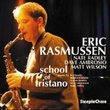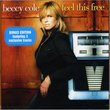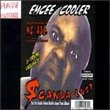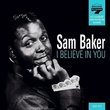| All Artists: Martin Souter Title: The Fitzwilliam Virginal Book Members Wishing: 1 Total Copies: 0 Label: The Gift of Music Original Release Date: 1/1/2006 Re-Release Date: 3/5/2004 Genre: Classical Style: Symphonies Number of Discs: 2 SwapaCD Credits: 2 UPC: 658592022926 |
Search - Martin Souter :: The Fitzwilliam Virginal Book
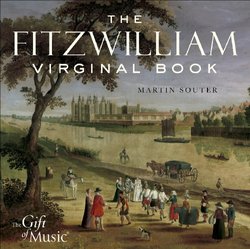 | Martin Souter The Fitzwilliam Virginal Book Genre: Classical
The Fitzwilliam Virginal Book. Martin Souter. The Fitzwilliam Museum in Cambridge houses one of the world's most important manuscripts of keyboard music. The music was composed by England's greatest composers of the early ... more » |
Larger Image |
CD Details
Synopsis
Product Description
The Fitzwilliam Virginal Book. Martin Souter. The Fitzwilliam Museum in Cambridge houses one of the world's most important manuscripts of keyboard music. The music was composed by England's greatest composers of the early seventeenth century and ranges from erudite fantasias to exquisite arrangements of popular songs and dances. Both these types can be heard on this album, along with the conventional pairing of slow and fast dances, the pavan and galliard. The music of the Fitzwilliam Virginal Book ranges from erudite fantasias - strict contrapuntal pieces of a refined style and beauty - to short arrangements of popular songs and dances. Both these types can be heard on this album, along with the conventional pairing of slow and fast dances, the pavan and galliard. Various character pieces are also dotted about in the collection, including the exquisite 'self-portraits' of Farnaby. The first album features a variety of instruments: harpsichord, organ and clavichord. The organ is that of Knole House in Kent and is contemporary with music. The instrument on the second album is a virginals made in 1983 by David Law. This small instrument has a big heart and is perfectly suited to the extravagance and joy conveyed by this wonderful music. The Fitzwilliam Virginal Book consists of a small folio volume of 220 leaves of paper, 209 of which are filled with music, which is written on six line staves ruled by hand. Our more familiar modern notation uses five line staves. The beautiful binding is of crimson morocco, with gold tooling. It was compiled between 1612 and 1619 by Francis Tregian during the time in which he was a prisoner in the Fleet prison in London. This wealthy, artistic and cultured man had been imprisoned, along with many others, by King James I of England, who had resumed a campaign of persecution of Catholics which the English royal family had been waging intermittently since the days of Henry VIII almost a century earlier. The Tregian family remained true to their faith, even in the face of great adversity. Arguably the greatest composer represented in the Fitzwilliam Virginal Book, William Byrd (c.1543- 1628) wrestled with the conflicting demands of both Catholic and Protestant patrons for most of his life. He was granted a royal charter allowing him to publish music and he was largely responsible for one of the first printed volumes of keyboard music which appeared at almost the same time as the Fitzwilliam Virginal Book was compiled. John Bull (c.1563-1628) had similar religious issues throughout his life as well, finally leaving England in 1612 'pour le foy catholique' as documents state. He ended his life as organist at the cathedral in Antwerp. It is possible, (though undocumented) that he knew Jan Pieterszoon Sweelinck (1562-1621), who was organist at the Oude Kerke in Amsterdam during the same period. Peter Philips (c.1561-1628) was another Englishman who fled the country for reasons of faith, moving via the abbey of Douai in Northern France to the English College in Rome where he produced, amongst other things, some fine Italian madrigals. Giles Farnaby (c.1561-1640) remained in England all his life. He may have spread his skill beyond musical composition into building keyboard instruments, and was also a farmer for many years. Munday was organist at St George's Chapel, Windsor. Johnson and Dowland were famous lute composers of the day whose music was frequently re-arranged by keyboard composers. The music of the Fitzwilliam Virginal Book ranges from erudite fantasias - strict contrapuntal pieces of a refined style and beauty - to short arrangements of popular songs and dances. Both these types can be heard on this album, along with the conventional pairing of slow and fast dances, the pavan and galliard.
Similar CDs
| Eric Rasmussen School of Tristano Genres: Jazz, Pop Label: Steeplechase | |
| Beccy Cole Feel This Free Genre: Country Label: ABC Music | |
| Emcee Cooler Scanda Lust Genres: Pop, Rap & Hip-Hop Label: Four Sight | |

 Track Listings (13) - Disc #1
Track Listings (13) - Disc #1
